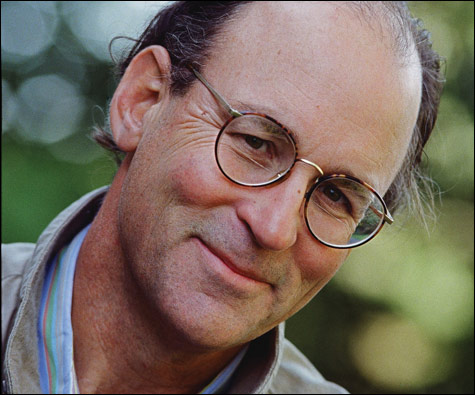Tracy Kidder gets into the picture
By JEFF INGLIS | October 15, 2009

Photo: Gabriel Amadeus Cooney
STARTING A NEW CHAPTER? Kidder goes global with his documentary style. |
| Strength in What Remains: A Journey of Remembrance and Forgiveness | By Tracy Kidder | Random House | 277 pages | $26 |
As Tracy Kidder’s immersive journalism matures — his latest book recounts his travels through genocidal East Africa — he becomes more visible. He featured significantly in his debut book, The Road to Yuba City (1974), which chronicled the murders of migrant farm workers in California. But he so regretted putting himself in the story that in 1981 he bought the rights back to prevent future republication, and he declines to list Yuba City on his books’ “Also by this author” pages. He began to disappear from the narrative in The Soul of a New Machine (1981), which won the 1982 Pulitzer for general non-fiction. By House (1985), he had perfected the art of invisibility. A passage describes the view from the ground, then quotes a builder on the need for everyone who goes up a ladder to carry a box of shingles, and then — with no acknowledgment that Kidder himself climbed and carried — moves to a scene on the roof.He stayed hidden through the rest of what became a four-book-deep study of his community in Western Massachusetts: Among Schoolchildren (1989), Old Friends (1993), and Home Town (1999). But he allowed himself back in Mountains Beyond Mountains, the 2003 volume that garnered lots of publicity for the book’s subject, Dr. Paul Farmer, and Farmer’s effort to bring health care to rural Haiti. After a reflective Vietnam War memoir, My Detachment, in 2005, Kidder releases Strength in What Remains: A Journey of Remembrance and Forgiveness, the second in what might become a series of intensely personal global social-issues investigations.
Strength’s prologue shows Kidder and Deo, the book’s main subject, driving through Burundi, returning to Deo’s home village more than a decade after his escape to America from the Hutu-Tutsi massacres of 1993 and 1994. The first section covers Deo’s youth, the civil war’s interruption of his studies to become a doctor, his flight through the wilderness, and how he rebuilt his life starting as a poor refugee in New York City.
Kidder’s gift is in the way he merges eagle-eye on-the-spot reporting with probing after-the-fact interviews, making us not just observers but privy to people’s innermost thoughts. In his previous books, we were left to imagine the exhausting work of assembling all these details. But in Strength’s second section, he gives a master class in interviewing, offering his own thoughts, as well. His devotion to his work and his compassion for those he writes about is most poignant when he confesses that he feared he was asking Deo questions that would “traumatize him all over again. On several occasions, I offered to stop my search for his story and let his memories die, if they would. Once or twice, I hoped he would accept my offer. But he always declined.”
 Related
Related:
Praising Arizona, More different than alike, Frontrunners, More 
- Praising Arizona
As a tribute to the man and a goodbye to the band he was a part of for more than 20 years, the Bishop brothers, as Brothers Unconnected, are touring the country, and playing an acoustic set of Sun City Girls songs.
- More different than alike
In 1935, Franklin Delano Roosevelt established the Federal Writers’ Project (FWP) as part of the New Deal’s Works Projects Administration (WPA).
- Frontrunners
Comparisons with Alexander Payne’s Election won’t fly.
- Christmas On Mars
Stylized after the sci-fi B-movies of yore, the film recycles Atomic Age angst: a group living in a space station on Mars have run out of spare parts, and it seems that everyone’s doomed.
- Review: Pontypool
Bruce McDonald's ambitious shaggy-dog story combining elements of Talk Radio , William Burroughs, and Night of the Living Dead succeeds about as well as could be expected.
- Review: Crude
Joe Berlinger returns with a documentary that follows through on the promise of 1992's Brother's Keeper .
- Review: Beeswax
Beeswax as in, mind your own . . . ?
- Style meets stylus
It's a credit to Pixar's success that so many animated films of the past decade have been compelled to sport the sheen of CGI. But now that filmmakers have wrung reality out of 1's and 0's, they're starting to cast their eyes on the next frontier.
- What John did and saw
In anticipation of the July 1 release of Michael Mann's Public Enemies with Johnny Depp as John Dillinger, and as part of its week-long "Classic Gangsters" series, the Brattle is screening two rarely seen films this Sunday: John Milius's 1973 Dillinger and W.S. Van Dyke's Manhattan Melodrama.
- Mad Men on Mass Ave
We have many long, painful, Mad Men– less months stretching ahead of us, as we wait for the show to return to AMC and shower us with more broken marriages, snappy quips, jaw-dropping revelations, and (hopefully) amputated limbs.
- 52 ways to leave 2009
Your usual lackadaisical approach to New Year's Eve — just see what happens and go with the flow — is not going to cut it this year. Sure, the end of this decade may not have the same kind of new-millennium pressure riding on it as the last one, but the plunge into 2010 is a milestone nonetheless.
- Less

 Topics
Topics:
Books
, Media, War Crimes, Genocide, More  , Media, War Crimes, Genocide, Book Reviews, War and Conflict, Brattle Theatre, Porter Square Books, Paul Farmer, Books and Literature, Tracy Kidder, Less
, Media, War Crimes, Genocide, Book Reviews, War and Conflict, Brattle Theatre, Porter Square Books, Paul Farmer, Books and Literature, Tracy Kidder, Less 